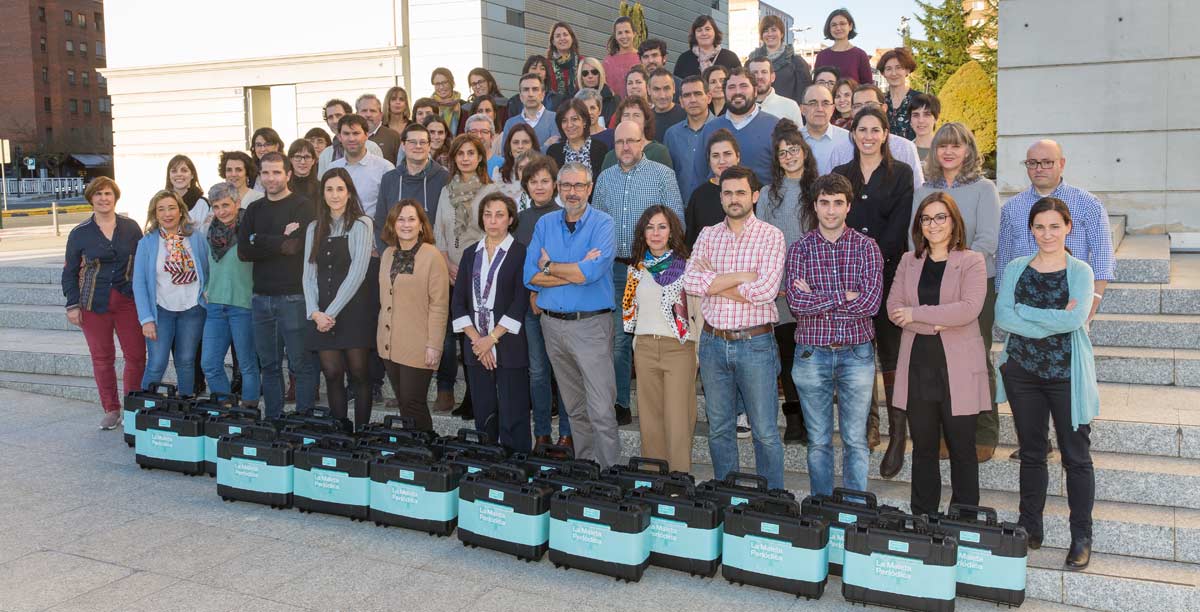History

The year 2019 was proclaimed by the United Nations General Assembly as the International Year of the Periodic Table, as this year marked the 150th anniversary of the creation of the Periodic Table by the chemist Dmitri Mendeleev. The periodic table is an essential tool for scientists, which is why we developed a project called "The Periodic Suitcase".
Its first edition (academic year 2019-2020) was funded by the Spanish Foundation for Science and Technology (FECYT) and supported by the Ministry of Science, Innovation and Universities.
This project sought to bring science, specifically chemistry, closer to the public in a visual way, and to become a tool to promote the understanding of chemical concepts, which are often abstract.
The suitcase provides the necessary reagents for the execution of the experiments and the descriptions corresponding to each one of them. The different experiments can deal with different concepts and can therefore be used throughout the course on multiple topics and at different levels of knowledge.
Currently 3.484 billion people are active users of social networks. This represents 45% of the world's population. Facebook and Instagram are two of the most popular social networks. However, teenagers tend to use them purely for social purposes. By sharing the activities of the periodic suitcase, the aim was to show that social networks are a powerful tool for scientific communication and a very valid complement for learning. For this reason, all participants were encouraged to generate audiovisual material in the various sessions and to share it:
1. Through Facebook and/or Instagram with the hashtag #lamaletaperiodica, and tagging the Facebook page "Química Universidad de Navarra" and Instagram @quimica_unav,
2. Sending them by DM for further publication.
The periodic case was designed to be used in three different formats:
In the first edition (academic year 2019-2020), 25 schools in Navarre obtained a suitcase after a face-to-face training session with at least one of their teachers (aimed at E.S.O., Bachillerato and Vocational Training schools). In the second edition (academic year 2020-2021) we expanded the project throughout the country, 32 schools obtained the suitcase after an online training session.
Between one and three teachers from the school concerned were trained in a workshop where they were shown the contents of the suitcase, and the experiments it contains were explained. After the training, the teachers took the suitcases back to their schools and used them with their students, either in their classes or in workshops.
All those schools at national level or in Navarre that did not have a suitcase were able to request one or more sessions. When required by the school, a chemistry graduate from the University of Navarra came to the school to carry out an hour-long workshop with a selection of experiments. The experiments were carried out by this person, and pupils volunteered to take part in them. The students were able to take photographs or videos of the experiments (edited or not), to share them on social networks (Facebook: Química Universidad de Navarra and Instagram: @quimica_unav). At the end of the workshop, they completed a survey that was analysed by the project team. The request for these visits was made through the delegate corresponding to their Autonomous Community.
The Science Museum of the University of Navarra held during Science Week 2019, in the Inclusive Campus 2019 and throughout the months of January to June 2020 a series of workshops, open to all audiences, where some experiments were shown and others could be carried out by the attendees themselves.